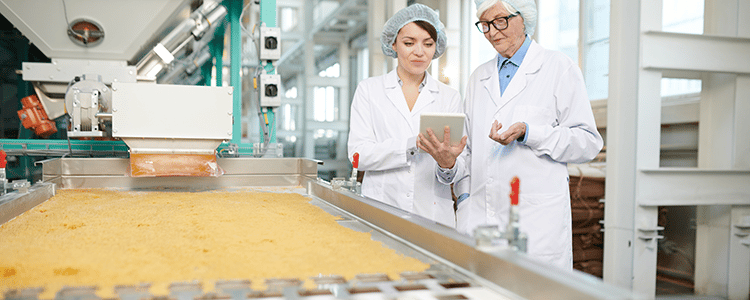- IoT technologies are improving production efficiency by providing real-time insights into equipment performance, quality control, and inventory management.
- Generative AI is enabling food and beverage companies to develop innovative product formulations tailored to regional and consumer-specific trends.
- Advanced predictive analytics is helping organizations optimize inventory levels, reduce waste, and navigate supply chain disruptions more effectively.
- Blockchain is helping F&B companies enhance traceability and transparency, strengthening consumer trust in product sourcing.
- Scalable cloud solutions and robust IT infrastructures are supporting the integration of cutting-edge technologies while safeguarding sensitive operational data.
In the food and beverage sector, technological advancements are helping organizations enhance operational efficiency and reshape consumer interactions. From optimizing production schedules to enabling customers to track ingredient sourcing, these innovations are changing the game.
As a CIO, it’s essential to understand the latest technology trends in the food and beverage industry, especially when it comes to enterprise software. By adopting modern solutions, you can address supply chain disruptions, rising consumer expectations, and more.
Today, we’re exploring food and beverage industry examples of how modern software systems are solving traditional challenges.
The 2025 Top 10 ERP Systems Report
What vendors are you considering for your ERP implementation? This list is a helpful starting point.
F&B Technology Trends to Guide Your Software Selection
1. IoT and Smart Manufacturing
The Internet of Things (IoT) is revolutionizing manufacturing processes in the food and beverage industry. IoT devices collect and analyze data from various stages of production to monitor quality control, manage inventory levels, and ensure equipment efficiency.
For instance, smart sensors on production lines can detect potential defects or contaminations before they become critical. In addition, these sensors can help managers perform tasks such as:
- Maintaining safe temperatures
- Counting inventory
- Monitoring equipment performance
However, IoT adoption is not without challenges. Implementation costs, integration with legacy systems, and cybersecurity risks remain significant concerns for many F&B companies. We recommend prioritizing IoT solutions that integrate seamlessly with ERP software and investing in robust cybersecurity measures to protect sensitive operational data.
2. AI and Machine Learning for Demand Forecasting and Personalization
Artificial intelligence (AI) and machine learning (ML) are helping F&B companies predict consumer demand and personalize customer experiences. By analyzing vast amounts of data, these technologies can forecast buying patterns and preferences with high accuracy.
For example, a snack company might use AI-powered ERP software to analyze purchase data and social media trends, allowing the company to anticipate dietary trends. At the same time, it might use AI-driven chatbots and recommendation systems to personalize marketing and enhance customer engagement.
Expert Tip
CIOs should prioritize clean data pipelines and combine AI-driven forecasts with human oversight. This reduces bias, while enhancing forecasting accuracy. Additionally, integrating AI with real-time customer feedback loops can refine predictions and adapt personalization strategies.
3. IT Infrastructure Advancements
As food and beverage companies integrate modern and emerging technologies, the necessity for robust IT infrastructure has become apparent.
Our ERP software consultants always tell clients that an optimized IT infrastructure is crucial for handling increased data volumes and complex system integrations.
Here’s a look at the key elements of an optimized infrastructure:
- Scalable Cloud Solutions – Many F&B companies are transitioning to cloud computing to ensure scalability and flexibility. Cloud platforms allow businesses to manage vast amounts of data, facilitating seamless operations and real-time analytics.
- Advanced Network Architectures – The adoption of Software-Defined Wide Area Networks (SD-WAN) continues to grow. SD-WAN provides enhanced connectivity, reliability, and control when it comes to applications used across multiple locations. This is especially crucial for companies with extensive distribution channels.
- Enhanced Cybersecurity Measures – As digital data becomes more integral to operations, protecting this data has risen in priority. F&B companies are investing in sophisticated cybersecurity solutions to safeguard sensitive information from breaches and cyber threats.
4. Generative AI for Recipe Development and Product Innovation
Generative AI has emerged as a game-changer in the F&B sector by automating the creation of innovative recipes, product formulations, and flavor profiles. By analyzing vast datasets on ingredient combinations, consumer preferences, and nutritional requirements, AI can propose novel products tailored to emerging trends.
For example, a beverage company might use generative AI to help develop a line of plant-based protein drinks optimized for regional taste preferences. Using generative AI would reduce R&D costs and shorten time-to-market through rapid prototyping.
[Learn about generative AI adoption challenges.]
5. Blockchain for Enhanced Traceability and Transparency
F&B manufacturers are increasingly using blockchain technology to improve traceability and transparency in the food supply chain.
This trend is particularly relevant given the growing consumer demand for ethical sourcing and sustainability. Blockchain enables immutable recording of every transaction or product movement on a supply chain.
For instance, a seafood distributor might use blockchain to allow consumers to track the journey of seafood from the ocean to the supermarket shelf, boosting consumer trust and ensuring regulatory compliance.
Expert Tip
Integration costs, scalability limitations, and resistance from supply chain partners can delay blockchain implementations. Overcoming these obstacles requires stakeholder alignment and pilot testing to build confidence in the technology.
6. Innovations in Customer-Facing Technologies
Recent advancements in customer experience technology aim to address the growing demand for faster and more personalized service. Some of the top innovations that food and beverage companies are using to enhance the customer experience include:
- Cloud-Based Delivery Optimization Platforms – These platforms use AI and machine learning to predict delivery times, optimize routes, and manage orders in real-time.
- Next-Generation Mobile Apps – Mobile apps in the F&B sector now feature AI-driven personalization, voice ordering, and integrated augmented reality (AR) experiences.
7. Advanced Predictive Analytics for Supply Chain Resilience
The disruption of global supply chains in recent years has underscored the importance of agility and foresight. Predictive analytics has evolved to address these challenges by combining real-time data with external information like weather patterns and geopolitical risks.
For example, many modern supply chain management systems use predictive models to optimize inventory levels dynamically, mitigating risks like overstocking and shortages.
When our ERP consultants work with food and beverage companies, we often prioritize platforms that integrate supplier risk monitoring with demand forecasting and provide scenario planning tools based on diverse data inputs. These features help companies proactively adjust procurement and distribution strategies, reducing downtime and ensuring consistent product availability.
Improve Efficiency and Make More Informed Decisions
The latest technology trends in the food and beverage industry are not only fostering customer loyalty but enabling smarter decision-making in the C-suite and across the organization.
As F&B software continues to evolve, our business software consultants can help you navigate the changing landscape. Contact us below to learn more.













